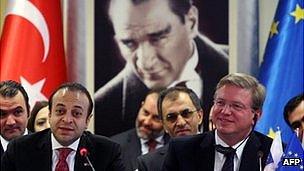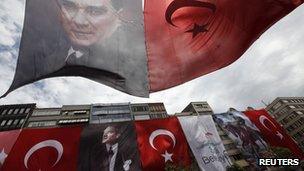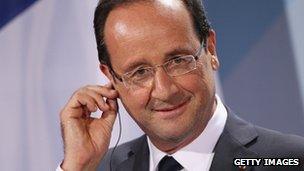Analysis: Turkey's long wait to join EU club
- Published

Turkey is the biggest issue on Mr Fuele's "to do" list
Nothing in Stefan Fuele's in-tray is more daunting than Turkey.
The European Union enlargement commissioner's job is to manage the accession of new member states, and Turkey's candidacy dwarfs that of any other country, in both its scale and complexity.
So Mr Fuele is a regular visitor to the country, but his trip this week is pivotal.
In a series of meetings with Turkish ministers in Ankara on Thursday - including both Prime Minister Recep Tayyip Erdogan and Foreign Minister Ahmet Davutoglu - he sought to draw a line under the increasingly negative sentiments expressed by both sides over the way Turkey's membership bid has ground to a halt.
They have launched a "positive agenda", highlighting areas where Turkey and the EU are co-operating, and devoting resources to them.
'Virtuous circle'
Mr Fuele has described this as "triggering a virtuous circle in Turkish-EU relations".
EU officials point out that the trading relationship with Turkey is still very strong, underpinned by a partial free trade agreement - called a customs union - since 1995, which is widely credited for much of Turkey's recent economic progress.
More than 40% of Turkish exports go to the EU.
They also work closely together on foreign policy - especially the crisis in Syria - energy and terrorism.
What they cannot do at the moment is restart the formal accession negotiations - the 35 chapters of EU law, known as the "acquis" - that Turkey must comply with before it is eligible to become a full member.
Each candidate has to open the chapters, relating to everything from the environment to human rights, change laws and government practice to match EU standards, and then agree with Brussels to close them.

Turkey must comply with all 35 areas of EU law in order to join the club
In the seven years since negotiations began, Turkey has opened only 13 chapters, and closed only one, on science and research. No chapters have been opened for two years.
Eighteen chapters have been frozen - eight by the EU, because of Turkey's refusal to allow Cypriot ships to use Turkish ports, and the remaining 10 by the governments of Cyprus and France.
Turkey and Cyprus are at loggerheads over the status of the divided island.
But French objections came from former President Nicolas Sarkozy, who believed Turkey did not belong inside the EU.
So the election of his rival Francois Hollande this month has raised the hopes of pro-Europeans in Turkey that the French veto will be lifted, and the accession negotiations could be re-started.
Mr Hollande has many other pressing problems, and his views on Turkey's membership are unclear. But quick action could allow another of the chapters to be opened, most likely the one on economic and monetary policy, before July, when Cyprus takes over the rotating presidency of the EU.
Turkey has said it will not co-operate with Cyprus, which it does not recognise.
The obstacles thrown in the path of Turkey's membership bid have caused very bruised feelings here, with politicians accusing sceptical governments of bad faith and anti-Islamic prejudice.
Economic vigour
The pugnacious Turkish EU Minister, Egemen Bagis, has said opening chapters is less important than opening minds.

Adieu Mr Sarkozy - the arrival of Francois Hollande is cheering to Turks keen to join the EU
Turks contrast their own economic vigour, with growth matching China's, to the woes of the eurozone, and say they need the EU less than the EU needs Turkey.
The writer and Nobel laureate Orhan Pamuk said recently that the hearts of Turkish Europhiles had been broken by the reluctance to welcome Turkey into the EU club.
EU officials counter that Turkey could, and should, do more to break the impasse over Cyprus, and to improve its human rights record.
Stefan Fuele is meeting the Turkish justice minister to push for judicial reforms, and several draft laws on this subject have been forwarded to the Turkish parliament this month.
Even some of Turkey's strongest supporters have been critical.
The International Development Committee of the British parliament published a report last month questioning why so much of Britain's overseas aid budget went to a successful middle-income country like Turkey, rather than poorer countries.
That aid goes through the EU, which will give a total of 860m euros (£690m) in 2012, rising to 935m euros (£751m) next year.
But most of this is specifically to support Turkey's accession process, for example helping its government departments conform to the EU acquis, or helping farmers adjust to EU agricultural standards.
Every prospective EU member is entitled to it, and what Turkey is receiving is quite modest compared to the costs of membership.
Meeting all the EU's environmental requirements, for example, is expected to cost the Turkish government and business community around 100bn euros (£80bn).
Such details have often been overlooked amid the cacophony of mutual recriminations in Turkey and Europe over who is to blame for the recent strains in their relationship.
- Published2 September 2014